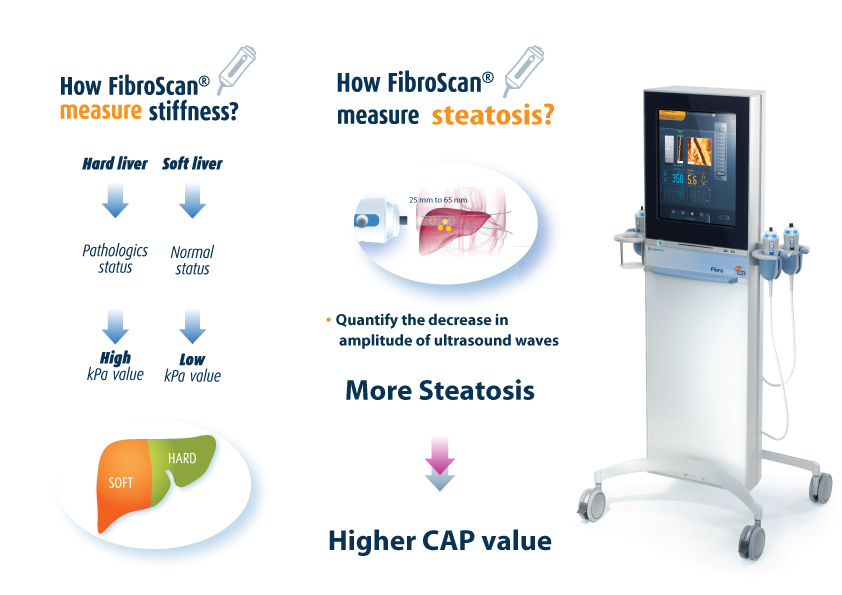
Chong Lap is proud to have become the exclusive distributor of Echosens in Hong Kong, Taiwan, and Macau.
Echosens SA is a young and dynamic medical imaging equipment company based in Paris, France. Their primary product, Fibroscan®, resulted from five years of development and research in an innovative technology called transient elastography. Fibroscan® is the world’s first non-invasive device for assessing hepatic fibrosis. The device measures liver stiffness by generating a shear wave from the probe to the tissues. This wave is then tracked by ultrasound flashes and its velocity is measured. Since stiffness is proportional to the speed of the shear wave in soft tissues, Fibroscan® allows practitioners evaluate liver stiffness in patients.
Fibroscan®
Fibroscan® is the world’s first non-invasive device for assessing hepatic fibrosis. The device measures liver stiffness by generating a shear wave from the probe to the tissues. This wave is then tracked by ultrasound flashes and its velocity is measured. Since stiffness is proportional to the speed of the shear wave in soft tissues, Fibroscan® allows practitioners to evaluate liver stiffness in patients with chronic liver diseases.
Why Fibroscan®?

Hepatitis B & C, diabetes, alcoholism, obesity, and certain drugs can cause liver fibrosis, cirrhosis, and even hepatcellular carcinoma (HCC). In Hong Kong, around 9% of the population are chronic hepatitis B (CHB) carriers, many of whom are at high risk of developing cirrhosis and HCC. Although not all CHB carriers develop cirrhosis, once a cirrhotic patient, it is 20 times more likely for HCC to develop within 10 years.
The most direct examination of the liver is done through a biopsy. However, its invasiveness and side-effects mean that it has been:
- Regulated to a later stage in the investigation of liver disease assessment
- Reduced in frequency since biopsy cannot ethically be used to monitor all but the most aggressive approaches
Experience supported by research has shown that liver biopsy has drawbacks such as:
- Considerable pain in 30% of cases
- 0.3% morbidity (haemorrage) and one death in 3,000 cases
- Difficult to reproduce and dependent on operators
- High error rate (25% false negatives for cirrhosis diagnosis)
- Expensive
Fibroscan® offers a different way of managing liver disease. By providing a non-invasive measurement of liver stiffness, the Fibroscan® gives the practitioner an easily-accessible insight into the patient’s liver condition without incurring risks for the patient. The measurement result is instantaneous, which allows the doctor to have immediate information for deciding the next course of action.
Fibroscan® is an excellent diagnostic device with advantages such as:
- Totally non-invasive and painless
- Quick and easy to use
- Rreproducible
- Quantitative
- Liver volume measured 100-200 times larger than liver biopsy
- Immediate results
- Operator independent
- Usable on almost all patients with compensated liver disease
In addition, unlike ultrasound imaging devices, only dexterity training is required for the operation of Fibroscan® , so it is accessible to any trained healthcare technician. The simplicity of Fibroscan® opens the possibility of:
- Incorporating Fibroscan® into diagnostic routines of specialized centers as an additional input to determine treatment choice and monitor treatment progress
- Using Fibroscan® routinely to assess the state of cirrhosis, determine the frequency of liver disease, and help decide on the type of monitoring used
- Devolving the screening of patients to peripheral centers; providing information about which patients need to be referred to a central specialized facility for more precise diagnosis
- Communicating the appropriate sense of urgency (or lack thereof) in treatment courses where compliance is a major factor
In summary, Fibroscan® allows faster and more informed decisions to be made based on a better understanding of the severity of fibrosis and cirrhosis, which can help doctors determine the prognosis for the patient.
Fibroscan® Screening
During the screening, the patient should lie down on the examination bed with his/her right hand behind his/her head. The practitioner will place the probe between the right ribs of the patient.
The screening is quick and easy, usually taking less than 15 minutes. Fibroscan® should only be administered by trained practitioners. Patients should consult their attending doctors before conducting the test.
Please contact us for additional information about Fibroscan®.
